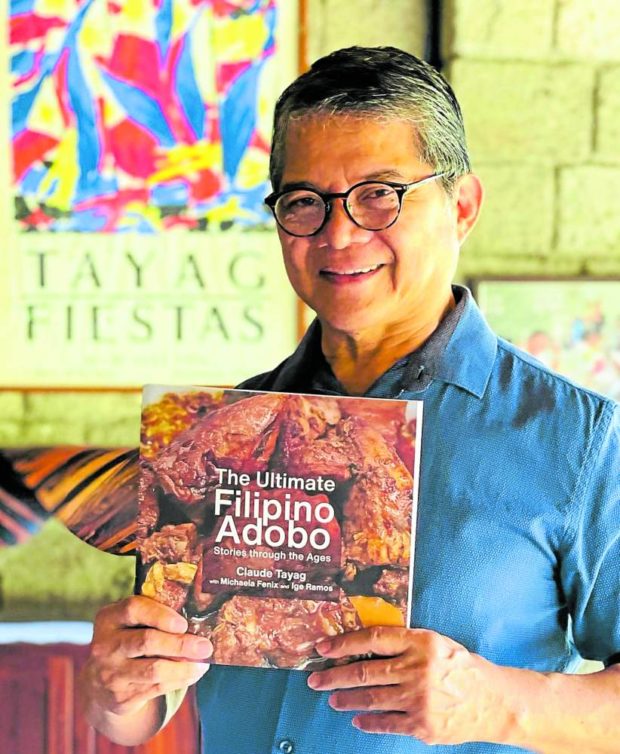National dish? Rethinking adobo

LIVING LEGEND Claude Tayag presents his latest book, The Ultimate Filipino Adobo. —contributed photo
Yesterday, the 100-day countdown to the Philippine Independence Day was launched. As we look forward to celebrating our nation’s birth, foodies might ask, do we finally have a national dish?
I got to attend a fabulous nine-course lunch recently, whipped up by living legend Claude Tayag, the artist/chef/author at his home, the famous private dining destination Bale Dutung. But it was no ordinary nine-course menu because for this very special lunch, every course was adobo!
The very inspired chef created eight courses of adobo dishes, presenting 17 varieties of adobo!
It was to offer readers a taste of the recipes in his latest book The Ultimate Filipino Adobo. It was really interesting because when we think of adobo, we usually think of the usual chicken and pork adobo. But here, Chef Claude used practically every creature you can think of, including crickets!
The first item on the menu was adobong kamaru, a Kapampangan (from the province of Pampanga) delicacy made of mole crickets commonly found on rice lands that are soaked in water or vinegar, then cooked adobo-style.
This was followed by three more starters that are usually enjoyed as pulutan or bar chow: adobong hipon, adobong tugak and adobong lubung. Hipon is shrimp; tugak is frog’s legs; and lubung or labong is bamboo shoot. I think he wanted to both shock and impress us with how unique Filipino adobo can be!
He also presented adobo using seafood. He served a dish called pescado adobado or marinated blue marlin, inspired by the cuisine of Seville. This was followed by chipirones en su tinta, a traditional Spanish dish originating from the Basque country made by searing and poaching whole baby squids until they become tender, served in a purée of sautéed vegetables, garlic and white wine, all tinted with squid or cuttlefish ink. And finally, there was pancit pusit, a delicacy of Cavite that uses squid ink to color the noodles black.
After sharing these Spanish-inspired delicacies, he went further back to pre-Hispanic adobos: pinamalhan nga salay guinto or pampano; lagat itu or what he described as adobong hito (catfish) sa dilaw (cooked in vinegar, without soysauce) and paksing pata (pork hock cooked in vinegar and soy sauce).
And then Chef Claude moved onto a more fancier take on adobo: four-way duck adobo confit. The first set was of chicharon but with duck skin; the second was rilette or a duck adobo patè; the third, crispy duck adobo flakes; and, finally, duck adobo confit.
Of course, he saved the best for last and finished off with Bale Dutung’s very own pork belly adobo confit.
What a treat of various kinds of adobo! While we were eating, there was a debate on whether or not adobo can be called the national dish. After all, Chef Claude has proven that practically every region, every province, even every town has its own version of adobo.
Well, whether or not it will ever be resolved what the national dish can or might be, one thing’s for sure: adobo gives us both a sense of national pride and national delight. It’s a dish that is in the heart of every Filipino!
